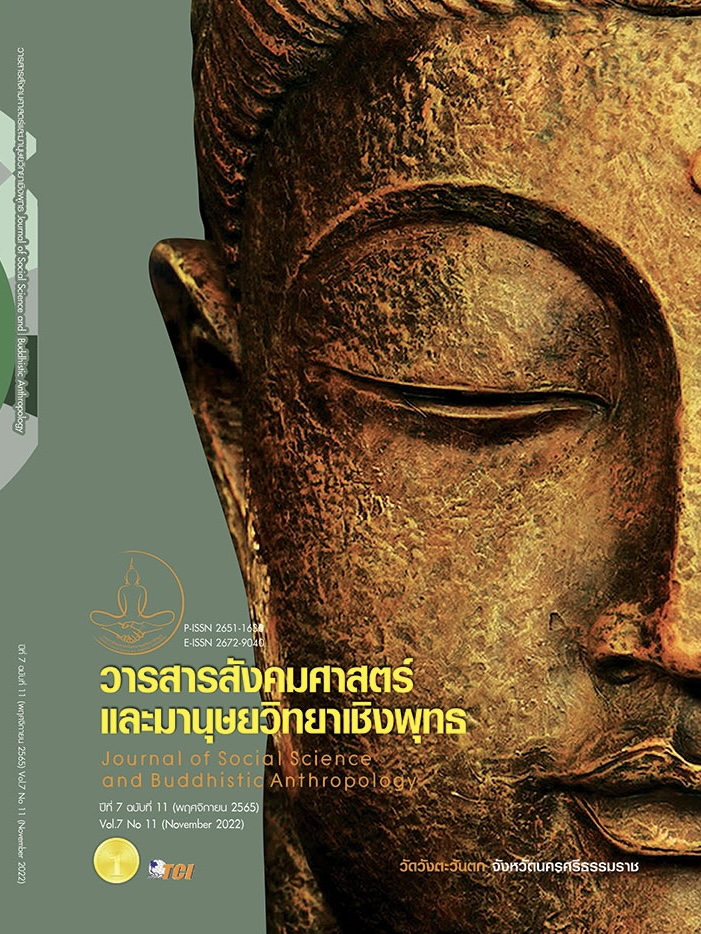ROLES AND COMPETENCIES OF FORENSIC ACCOUNTING IN THAI SOCIETY
Keywords:
Accountant, Forensic Accounting, Core CompetenciesAbstract
The objective of this academic paper presents the results of a study on documents, concepts, theories, the research related to forensic accounting’s core competencies, and a study on the Roles and importance of Forensic Accounting in Thai Society. The result showed that; The core competencies of Thai forensic accountants comprise 1) Hard skills include skills and knowledge concerns, for example, knowledge of evidence, fraud, accounting, business, and laws that are related to the competency and expertise in investigations. 2) Soft skills include the ability to communicate and the ability to build relationships with people. As for the role and importance of accounting and forensic accountants in Thai society. Because at present, corruption is complicated and the audit is too difficult for a professional accountant can verify. This may be due to the development of accounting information technology. It helps the fraudsters to modify and change the numbers seamlessly. Therefore, forensic accountants are important and play a role in applying their accounting, auditing, and investigative skills to use in financial audits of a person or business. By calculating the values of various data to draw conclusions and identify unusual or suspicious patterns of transactions through analyzing financial data. On the operational, the forensic accountant will not show their opinion in the same way as general auditors but will be the one who provides facts that can solve criminal cases related to corruption in court. Which is beneficial to the profession of accounting. And it is of high value to the accounting services that professional accountants will have to society and the nation as a whole.
References
จารุวรรณ สุขุมาลพงษ์. (2556). แนวโน้มของคอรัปชั่นในประเทศไทย. กรุงเทพมหานคร: สำนักงานเลขาธิการสภาผู้แทนราษฎร.
ณฐา ธรเจริญกุล. (2559). สมรรถนะของพนักงานบัญชีที่ส่งผลต่อประสิทธิผลการทำงาน กรณีศึกษา สถานประกอบการธุรกิจอุตสาหกรรม อำเภอเมือง จังหวัดสมุทรปราการ. สมาคมสถาบันอุดมศึกษาเอกชนแห่งประเทศไทยในพระราชูปถัมภ์ สมเด็จพระเทพรัตนราชสุดาฯ สยามบรมราชกุมารี, 24(1), 58-70.
ณรงค์วิทย์ แสนทอง. (2557). มารู้จัก Competency กันเถอะ. กรุงเทพมหานคร: เอชอาร์เซ็นเตอร์.
ธนวรรณ แฉ่งขำโฉม. (2562). ตัวแบบการจัดการที่มีประสิทธิภาพในการพัฒนาสมรรถนะของผู้ทำบัญชีในสำนักงานบัญชีคุณภาพในประเทศไทย. ใน ดุษฎีนิพนธ์ปรัชญาดุษฎีบัณฑิต สาขาวิชาการจัดการ บัณฑิตวิทยาลัย. มหาวิทยาลัยสยาม.
ธนิษฐา ชีวพัฒนพันธุ์. (2558). สมรรถนะของพนักงานบัญชีในโรงงานอุตสาหกรรมในพื้นที่จังหวัดนนทบุรี ตามทัศนะของหัวหน้างานบัญชี. RMUTT Global Business and Economics Review, 10(2), 142-152.
นิพันธ์ เห็นโชคชัยชนะ. (2559). ความหมายและขอบเขตของการบัญชี. วารสารวิชาชีพบัญชี, 12(35), 86-97.
นิวัติไชย เกษมมงคล. (2564). ดัชนีรับรู้ทุจริตปี 63 ไทยอยู่อันดับ 104 ของโลก. เรียกใช้เมื่อ 18 มิถุนายน 2564 จาก https://www.infoquest.co.th/2021/62561
พรรณนิภา รอดวรรณะ. (2556). การบัญชีต้นทุนหลักและกระบวนการ. กรุงเทพมหานคร: สำนักพิมพ์แห่งจุฬาลงกรณ์มหาวิทยาลัย.
ราชบัณฑิตยสถาน. (2556). พจนานุกรม ฉบับราชบัณฑิตยสถาน พ.ศ. 2554 เฉลิมพระเกียรติพระบาทสมเด็จพระเจ้าอยู่หัวเนื่องในโอกาสพระราชพิธีมหามงคลเฉลิมพระชนมพรรษา7 รอบ 5 ธันวาคม 2554. กรุงเทพมหานคร: ราชบัณฑิตยสถาน.
ศจีรัตน์ เมธีสุวภาพ. (2563). คุณค่าของนิติวิทยาศาสตร์ในทรรศนะของผู้สอบบัญชีรับอนุญาตที่รายงานต่อสภาวิชาชีพบัญชี. วารสารสุทธิปริทัศน์, 34(109), 186-201.
ศิลปพร ศรีจั่นเพชร. (2555). มารู้จักกับการบัญชีสืบสวน. วารสารวิชาชีพบัญชี, 6(17), 22-28.
สภาวิชาชีพบัญชีในพระบรมราชูปถัมภ์. (2554). ประกาศสภาวิชาชีพบัญชี ปี 2554. เรียกใช้เมื่อ 25 เมษายน 2564 จาก https://www.tfac.or.th/Article/Detail/66901
สภาวิชาชีพบัญชีในพระบรมราชูปถัมภ์. (2555). มาตรฐานการรายงานทางการเงิน ฉบับที่ 3 (ปรับปรุง 2552) เรื่อง. “การรวมธุรกิจ”. กรุงเทพมหานคร: สภาวิชาชีพบัญชีในพระบรมราชูปถัมภ์.
สมชาย ศุภธาดา. (2562). การบัญชีนิติวิทยา. (พิมพ์ครั้งที่ 1). กรุงเทพมหานคร: โรงพิมพ์ตำรวจ.
AICPA. (2010). FVS Practice Aid 10-1: Serving as an Expert Witness or Consultant. New York: American Institute of Certified Public Account.
Boyatzis, R. (1982). The Competence manager: A model for effective performance. New York: Wiley.
Crumbley, D. & Apostolou, N. (2002). Forensic Accounting: A New Growth Area in Accounting. Ohio CPA Journal, 22(65), 16-20.
Crumbley, D. & Apostolou, N. (2003). What is Forensic Accounting? Forensic Accounting: Older than You Think. Journal of Forensic Accounting, 11(2), 181-202.
Crumbley, D. & Apostolou, N. et, all. (2005). Forensic and Investigative Accounting. Chicago: CCH Group.
Dale, M. & Hes, K. (1995). Creating training miracles. Sydney: Prentice - Hall.
Eliezer, O. & Emmanuel, B. (2015). Relevance of Forensic Accounting in the Detection and Prevention of Fraud in Nigeria. ch Letter, 23(2015), 17-25.
Hopwood, W. et al. (2008). Forensic accounting. Boston: McGraw-Hill/Irwin.
Lembke, V. & Smith, J. (2001). Financial accounting: a decision-making approach. 2nded. New York: Wiley, 2001.
McClelland, D. C. (1973). Testing for competence rather than for intelligence. New Jersey: American Psychologist.
Rasey, M. (2009). History of Forensic Accounting. Retrieved May 18, 2021, from http://www.ehow.com/about_5005763_history_forensic_accounting. html
Spencer, L. M. & Spencer, S. M. (1993). Competence at work: Models for Superior Performance. New York: John Wiley & Sons.
Taylor, J. (2011). Forensic Accounting by John Taylor. Canada: Pearson Education.
Downloads
Published
How to Cite
Issue
Section
License
Copyright (c) 2022 Journal of Social Science and Buddhistic Anthropology

This work is licensed under a Creative Commons Attribution-NonCommercial-NoDerivatives 4.0 International License.









